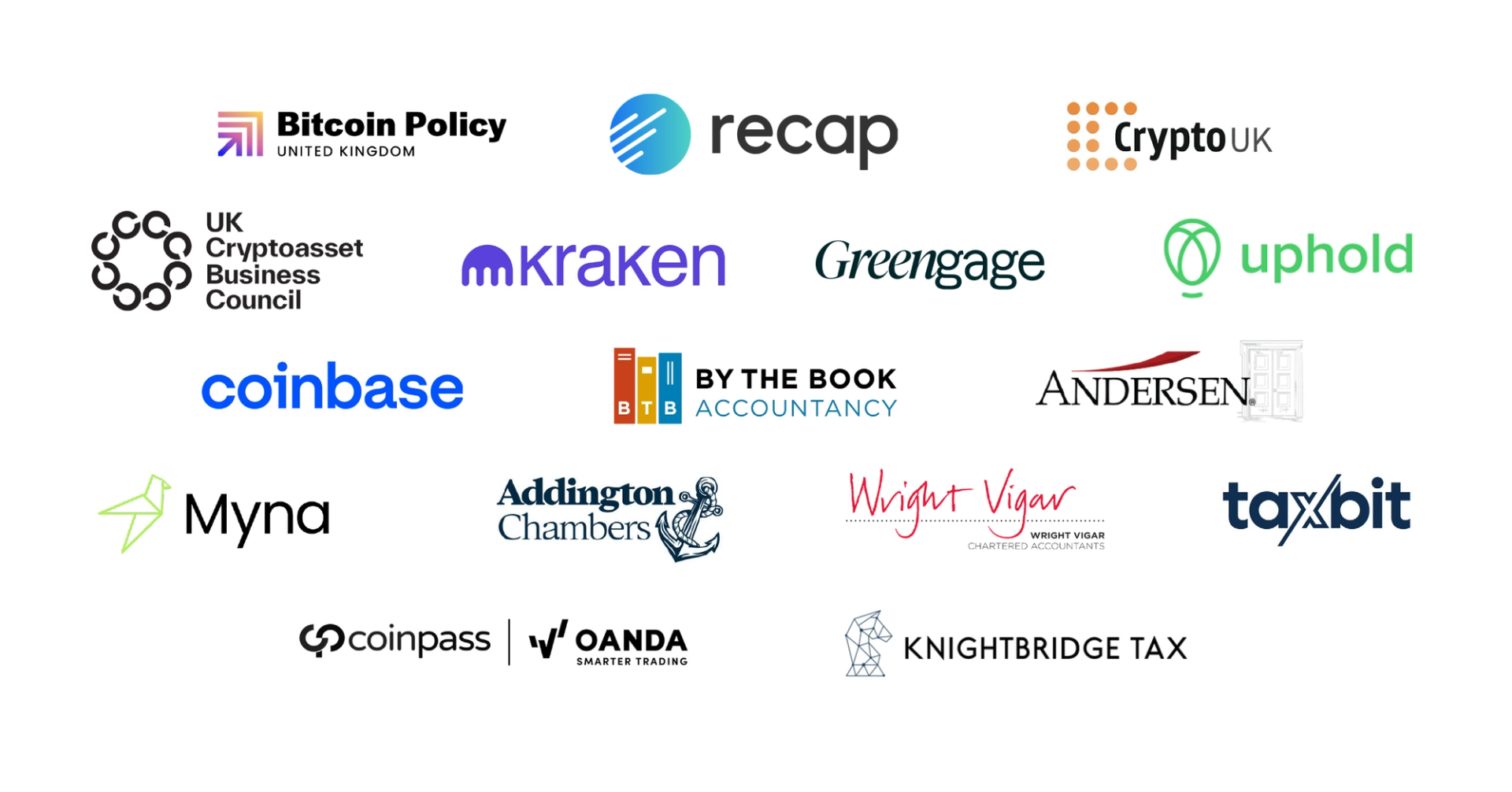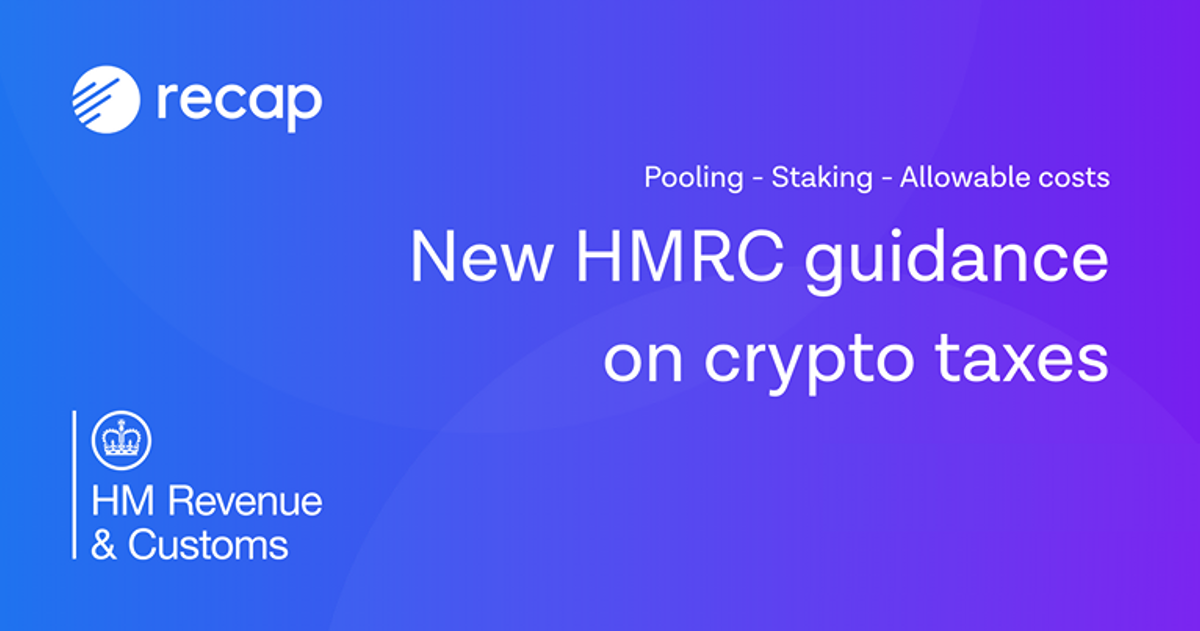

Representatives from all major UK crypto trade groups—including CryptoUK, the UK Cryptoasset Business Council, and Bitcoin Policy UK—joined forces with leading digital asset companies serving UK customers such as Coinbase, Kraken, Uphold, Greengage, Oanda and Coinpass, to urge the government to address pressing tax inequalities in the crypto sector.
The collective letter to Chancellor of the Exchequer Rachel Reeves MP, Economic Secretary to the Treasury and City Minister Emma Reynolds MP, and Exchequer Secretary to the Treasury James Murray MP calls for immediate legislative updates so that cryptoasset transactions—related to DeFi lending and staking—will no longer trigger taxable events. By doing so, the UK can strengthen its position as a global leader in cryptoasset innovation and deliver other key benefits, such as removing dry and unfair tax charges for investors, which currently impact an estimated 1.2 million people across the UK.
Below, we share the background of this development, why it matters for the UK’s financial services landscape, and the key takeaways from the letter.
Background: The Growing Need for Parity
Over the past few years, Bitcoin and other cryptoassets have gained increasing recognition as legitimate investments. However, UK tax law has not kept pace. Traditional securities that cover stocks and shares benefit from a “no gain, no loss” tax treatment when involved in repurchase (repo) or stock-lending agreements. This approach reflects the economic reality that merely lending a security (without actually selling it) should not trigger a taxable event.
In contrast, when it comes to lending or staking cryptoassets, such as Bitcoin, no equivalent tax relief exists. This disparity hinders the UK’s potential to become a global hub for cryptoasset financial services because it imposes additional administrative and tax burdens on an industry that relies on innovative financial products.
Key Takeaways from the Letter
- Economic Substance vs. Tax Reality
The signatories argue that DeFi lending or staking transactions should not trigger a taxable event, because no actual “disposal” takes place. They point out that traditional securities already benefit from this perspective under repo rules, and that extending similar provisions to cryptoassets would reflect the economic substance of the transaction. - Impact on Growth and Innovation
With cryptoassets taking on a bigger role in global finance, the UK risks missing a vast growth opportunity by maintaining an outdated tax stance. The collective stresses that if the UK wants to attract innovators and top talent, a supportive—and fair—tax environment is essential. - HMRC’s DeFi Consultation
HMRC has been consulting on DeFi taxation for nearly three years. Industry participants, including Recap (a crypto tax software provider), have proposed a workable “composite no gain, no loss framework.” While positive discussions have taken place, formal legislation remains pending—creating uncertainty for businesses and investors alike. - Levelling the Playing Field
The letter directly calls for the government to “treat cryptoassets in the context of DeFi lending and staking on par with traditional securities.” This plea aligns with the UK’s broader ambition to be a global leader in financial innovation. - A Call for Swift Action
Despite progress in regulatory discussions, tax policy has been “overlooked.” With crypto adoption continuing apace, the signatories emphasise that comprehensive tax reform is long overdue. Addressing this gap would not only reduce administrative burdens but also send a strong signal that the UK welcomes responsible crypto innovation.
Who’s Involved: A Unified Industry Voice

This letter is backed by a wide coalition of notable leaders and partner signatories, all urging the government to address the pressing tax inequality around DeFi lending and staking:
- Daniel Howitt – CEO and Co-founder, Recap
- Dion Seymour – Crypto and Digital Asset Technical Director, Andersen in the UK
- Freddie New – Co-Founder and Chief Policy Officer, Bitcoin Policy UK
- Suzanne Morsfield – Head of Policy, CryptoUK
- Simon Jennings – Managing Director, UK Cryptoasset Business Council
Partner Signatories
- Lawrence Zlatkin – VP Tax, Coinbase
- Perry Scott – Policy Manager (UK & APAC), Kraken
- Simon McLoughlin – CEO, Uphold
- Sean Keirnan – CEO, Greengage
- Jeff Hancock – Co-Founder & CEO, OANDA Coinpass
- Dr Max Bernt – Global Head of Regulatory Affairs, TaxBit
- Andy Wood – Tax Barrister, E Chambers
- Louise Lane – Associate Tax Director, Wright Vigar
- Laura Knight – Director, Knightsbridge Tax
- Robin Thatcher – CEO, By The Book Accountancy
- Jamie Nuttall - Director of Crypto Tax, MYNA
Each of these organisations brings a unique perspective—from tax consultancy to exchange services—illustrating just how unified the industry is on the need for fair and pragmatic crypto tax policies.
Beyond Regulation: The Importance of Taxation
Conversations about crypto in the UK often revolve around regulatory frameworks—covering AML, KYC, and licensing requirements. Yet tax policy is an equally critical piece of the compliance puzzle. Without an up-to-date approach to crypto taxation, the UK risks:
- Discouraging Retail and Institutional Adoption: Onerous tax rules deter new entrants and investors.
- Complex Filing Requirements: Investors must track every microtransaction, adding friction to an already-complex asset class.
- Lost Global Competitiveness: Other countries with more favourable regimes could outpace the UK in attracting crypto-focused businesses.
Looking Ahead: Potential Tax-Free Options and DST Revisions
While we understand crypto is a relatively new asset class, the industry would also like to see movement in other areas where there is financial inequality.
- Crypto-Focused ISAs or Equivalent
Currently, there are no tax-free “wrapper” options for cryptoassets akin to ISAs for stocks and shares. Implementing a similar mechanism for crypto could drastically reduce complexity for both HMRC and investors. - Digital Services Tax (DST) Overlaps
The DST exempts certain online marketplaces for traditional financial instruments, but this often doesn’t extend to crypto exchanges—despite offering similar products with similar risks. Industry leaders argue that parity is needed here as well to avoid imposing unjust burdens on crypto marketplaces.
Conclusion: Time for Action
The collective message from across the UK’s crypto industry is loud and clear: tax policy must evolve to reflect the reality of decentralised finance and the growing importance of cryptoassets. With so many industry heavyweights—ranging from software providers and policy advocates to leading exchanges—co-signing this letter, the momentum for change is undeniable.
As the UK government continues to refine its approach to financial services and cryptoassets, taking swift action on crypto tax policy will not only foster innovation but also cement the UK’s position as a forward-thinking global financial leader. The ball is now in the government’s court to make these long-overdue reforms a reality.



